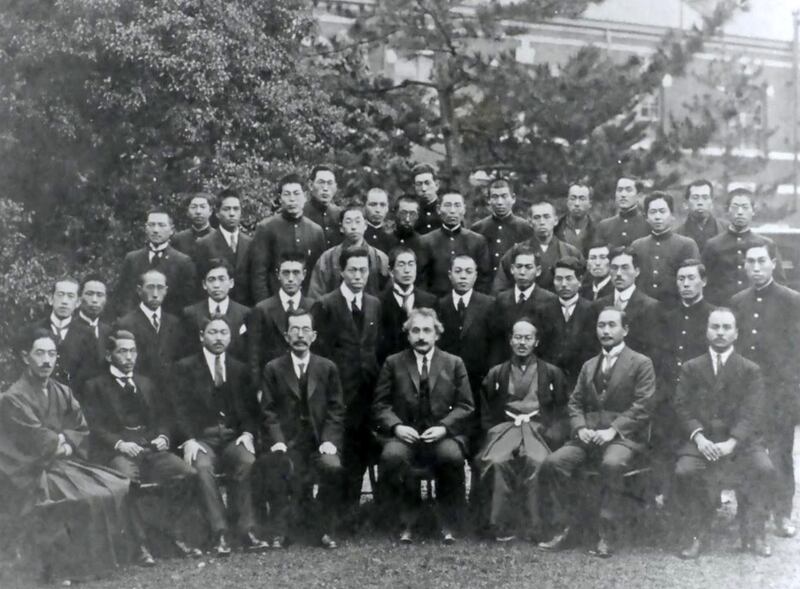Between late 1922 and early 1923, Albert Einstein set off an a tour of Asia that brought him into contact with a variety of non-European peoples. He recorded his raw impressions in a private journal. These entries were never intended for a public audience. There was, by then, a popular image of Einstein. He had acquired overnight celebrity in 1919 when Sir Arthur Eddington performed a test of his general theory of relativity.
Luminaries in Tokyo were entreating him to lecture in Japanese universities. Zionists wanted him to visit Palestine. Invitations came from South Asia and China. The political climate in Berlin was suffused with murderous anti-Semitism. On June 24, 1922, Walter Rathenau, Germany’s foreign minister – and a friend of Einstein’s – was assassinated. “I would not have thought that hate, delusion, and ingratitude would go so far,” Einstein wrote in a letter to the departed minister’s grieving mother. Einstein’s first wife, meanwhile, received news that there was a plot to kill her ex-husband.
All of this – combined with Einstein’s abiding fascination with the East – quickened his decision to vacate Berlin. He travelled via West and South Asia, landing first in Port Said and then going to Sri Lanka; in the latter place he encountered Indians properly for the first time. Eventually he would become an admirer of Indian civilisation and literature, and a friend to India’s founding personalities.
Initially, however, he used language to describe Indians that makes him susceptible, in our age, to the charge of holding “Orientalist” views as they came to be explicated by Edward Said in 1978. He described some of the people he met as “primitive”. Generally, he compared Indians favourably to the Arabs he had encountered at Port Said, but added that the poverty in which some of them lived “did not allow any distinct existence for the individual”.
The argument that poverty degrades humans and diminishes their chances of self-improvement is the trope of virtually every left-wing political party. It would be absurd to condemn Einstein for suggesting the same thing because his observation was directed at people of a darker complexion.
What Einstein wrote about Indians is infinitely less offensive – if it can be said to be offensive at all – than what Mahatma Gandhi, in his early years as a barrister in South Africa, said about that subcontinent’s black majority. Gandhi outgrew his racism, became a proponent of universal brotherhood and is now claimed by South Africa as one of its founding fathers. Einstein, if his diary is anything to go by, never had a racist bone in his body.
He made hasty generalisations, especially about the Chinese, that are not easy to reconcile with the sensitive and thoughtful public figure. He felt the Chinese were “industrious, filthy, obtuse people” and thought “it would be a pity” if they “supplanted all other races”.
But if his words seem like an echo of European xenophobia, consider what he said when visiting Palestine: “It does seem to me that our kinfolk [Jews in Palestine] really are more sympathetic (at least less brutal) than these horrid Europeans. Perhaps things can only improve if only the Chinese are left, who refer to all Europeans with the collective noun ‘bandits’.” There is a sense of solidarity and alliance here with the Chinese against the Europeans.
And if you think he was identifying with the Jews to the exclusion of others, consider his opinion of the orthodox among them: “obtuse ethnic brethren… with their faces turned to the wall, bending their bodies… in a swaying motion. Pitiful sight.”
_________________________
Read more:
Living in the shadows: Yazidi women tell of ISIS hell
Book review: John Zubrzycki looks at the history of Indian magic
'Warlight' is a shadowy, dimly lit novel of seductive beauty
_________________________
Ze’ev Rosenkranz, the director of Einstein Papers Project at the California Institute of Technology and the editor of this volume, admits that Einstein was no racist; but his claim that there was an element of “racism” in the way he “perceived” others is, in my view, not supported by the contents of Einstein’s diary. Einstein scribbled his crude and unprocessed thoughts, lest we forget, in a private journal. Even those who see some of his words dripping with prejudice must concede that no public position of his was animated by bigotry.
He was one of the past century’s most tireless anti-racists – a refugee from German anti-Semitism who made formidable enemies in the United States by championing equality for African-Americans. As an advocate of the rights of colonised peoples, he was far ahead of his time.
The pre-publication publicity for this book, centred on Einsten’s supposed “racism”, has done tremendous disservice to its subject. The Chinese can see this deplorable marketing ploy for what it is. “Diaries are extensions of private thought, and there’s no sin in thought,” one user on the Chinese social media site Weibo wrote in reaction to the deluge of press reports about Einstein’s “racist” attitudes based upon Princeton University Press’s promotional material. “No matter what he thinks, as long as he doesn’t speak or act in a racist way, then you cannot implicate him.”
In a life distinguished by accomplishment and camaraderie with the weak and downtrodden, so little of what Einstein wrote, even in private, seems truly abhorrent – as anyone who reads this book will discover. But damn the reputation of a good man: there are books to be sold.






